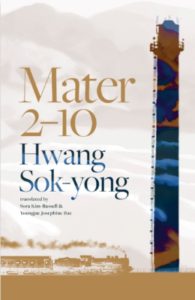
SHORTLISTED FOR THE INTERNATIONAL BOOKER PRIZE 2024
‘This is the story of my hometown with childhood memories, and it is also the story of contemporary workers. I would like to dedicate this novel to Korean workers by filling in a void in Korean literature… I wanted to trace the past 100 years of how their dreams have been transformed and distorted, and reveal the roots of their lives.’ Hwang Sok-yong
‘A masterpiece of Korean history: This epic political novel traces the country from Japanese occupation through partition, as experienced by a family of railway workers… Not only does he breathe life into vivid protagonists, but the novel so inhabits their perspective that we share the shock and disbelief as their hard-won freedom is snatched away.’ The Guardian
‘A large and comprehensive book about a Korea we rarely see in the West, blending the sweeping historical narrative of a nation with an individual’s quest for justice. Hwang highlights the political struggles of the working class with the story of a complicated national history of occupation and freedom, all seen through the lens of Jino, on his perch on top of a factory chimney, where he is staging a protest against being unfairly laid-off.’ International Booker Prize judges
‘It is to Korea what One Hundred Years of Solitude is to Colombia or Midnight’s Children is to India’ Livemint https://lifestyle.livemint.com/how-to-lounge/books/hwang-sok-yong-korean-novel-nominated-for-the-international-booker-prize-111713774511293.html
Hwang’s new novel unfurls at full speed. The story of three generations of railroad workers from Lee Ji-chul to Yi Jino, his great-grandson and factory worker in current times, who is left high and dry by his employers and protests by occupying the top of the sixteen-story factory chimney. During the cold and long nights, he talks to his ancestors and friends, chewing on the meaning of life, on wisdom passed down the generations.
Hwang has here achieved something rare – a novel that reflects the lives of modern industrial workers, presenting their roots through lives spanning over a hundred years and bringing those characters missing from our literary history, to the fore. The culmination of his life’s work, it showcases Hwang at his best: bridging political struggle with literature.
‘This nearly 500-page novel opens with a laid-off railroad worker in Seoul camped out on a platform atop a factory chimney, where he will stay for 410 consecutive days in protest. As he braves the elements, his ancestors, also railroad workers, visit to relive the murders, imprisonment and torture they endured under Japanese and U.S. occupation while fighting for better working conditions. The Nobel Prize in literature almost always goes to a European, but for the next one that’s awarded to a non-European, I’m rooting for Hwang Sok-yong, perhaps South Korea’s most renowned author.’ Leland Cheuk, book critic and author of the No Good Very Bad Asian, NPR Best Books of 2023
‘This book has “major work by major writer” written all over it, and it is certainly a novel of epic ambition and convincing delivery. Mater 2-10, like Hwang Sok-yong’s previously translated novels, Familiar Things and the Booker-longlisted At Dusk, shows a writer with panoramic range on societal issues, who still retains a compassionate touch with human stories at a more intimate level.’ Irish Times
‘The story can be read as either an earnest story with noted sympathy for the workers’ movement and the activism of the Josen Communist Party during the struggle against the Japanese. Indeed the author claims the story was inspired by an aging former activist he met in Pyeongyang during an illegal trip to North Korea. Conversely, it could also be a satire of those who claim to work for the common man, but who are often more involved in esoteric ideological discussion than in actual work, as when the leaders of the communist movement in Korea don’t live in Korea at all and spend far too much time discussing and debating the “Party line” when fellow activists are being tortured to death.’ Asian Review of Books
‘The male narrative of the three generations of railroad workers is complemented by female narratives. In particular, in the flooded Yeongdeungpo area, the legendary performance of Juandaek, who saved people and goods with superhuman strength and wisdom, and outstanding wit, and Shingeumi’s magical powers and foresight, prevent this novel from being confined to rigid realism. The depiction of the old times around Yeongdeungpo, where the author’s own childhood memories dwell, makes even readers who have nothing to do with the time and space immerse themselves.’ The Hankyoreh newspaper
‘A cross-section of the 100-year history of the Korean Peninsula woven by Hwang Sok-yong, a world-renowned master beyond Korea.’ Seoul Shinmum
Sales
- Changbi Korea
- Scribe World English
- Editions Philippe Picquier France
- Alianza World Spanish
- Hakusuisha Japan
- Ombra Albania
- Editura Trei Romania
- Dogan Kitap Turkey
- Eksmo Russia
- People’s Press Denmark
- Jagiellonian University Press Poland
- WF Howes English audio
- Dardanos/Gutenberg Greece
- Pi Press Arabic
- Elsinore/PRH Portugal
- Alatoran Azerbaijan
Material: Finished copies and PDF of the Korean edition (600pp), PDF of English edition